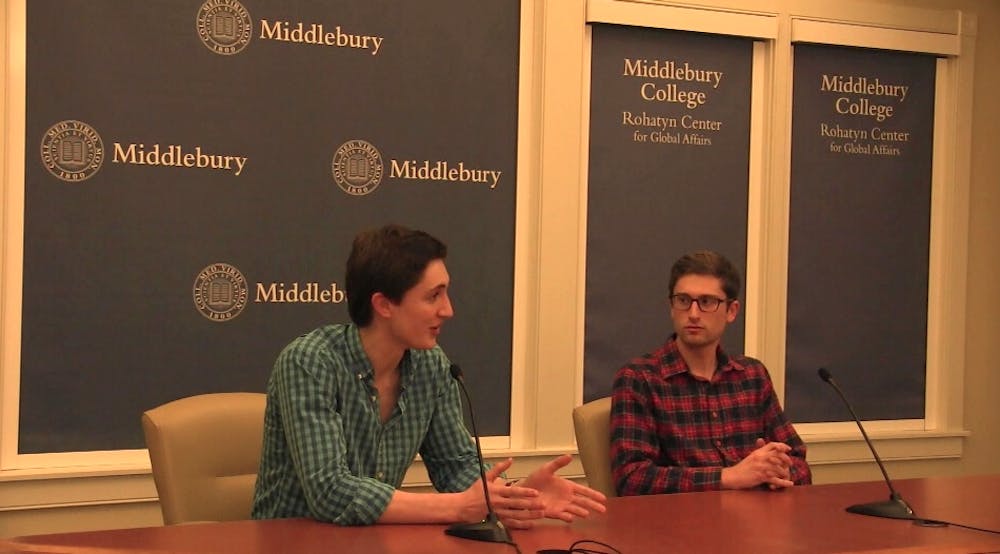In anticipation of the Student Government Association (SGA) elections, a discussion was held on Wednesday, April 23, between Taylor Custer ’15, the candidate for SGA president, and Ben Bogin ’15 the Student Co-Chair of the Community Council candidate. Editor-in-Chief of the Campus, Kyle Finck ’14, and General Manager of WRMC, Ben Goldberg ’14, moderated the discussion.
From this guided conversation, the panel learned the goals and objectives of each candidate and their stance on some of the current issues the campus faces.
The discussion began with a conversation about the honor code. In light of the New York Times article and recent debate on campus, Finck asked Custer if the honor code was dead and if so, how it could be revitalized. Custer responded, “Although I do not think it is dead, I think the honor code could die if we don’t do something about it.”
Custer suggested that the honor code be moved out of McCullough and into the Davis Family Library.
“If we are serious that the honor code contributes to culture,” Custer argued, “then putting it in a building that most of us only go to on Friday and Saturday nights really detracts from it.” Custer also suggested that the presentation and display of the honor code be altered, highlighting that the little details must be taken seriously.
The conversation of the honor code was narrowed to whether or not the code should adopt a one-strike policy. While both candidates were open to it, they each pointed to the need for nuance and flexibility. Bogin proposed that the judicial boards be awarded more jurisdictions so harsher punishments can be given when necessary.
The conversation shifted to the swipe-card system being implemented next year. Custer urged the student body to see the benefits in this change and hopes that the transition will be executed properly. He described an app that was designed at a MiddCore workshop, in which data from the swipe system would be used to tell the viewer how many people were in Proctor or Ross at any given time.
Bogin also supported the swipe card system because it will help the budget, but opposed the idea of a meal plan because he believes that such a change would detract from the current dining hall culture.
Also discussed was the possible change to the AAL requirements to which both candidates acknowledged the commitment from students and disinterest from faculty.
“Students care very deeply about the issue,” Custer acknowledged, “but pushing it even though we know we will not see effective change is not productive and is a losing proposition for everyone.” Custer promised to make sure faculty are told students care about the issue, but admitted, “it is not useful for the SGA to do anymore than its done.”
Bogin also acknowledged the current stalemate and disconnects. He added, “We do not have a large stake in academics, so we can do less than SGA.”
Prompted on where improvements from this past year will be made, Custer recognized the need for more public relations in response to the current disconnect “between what the SGA can get done and what students think the SGA can do,” he said.
Looking forward to his time on the Community Council, Bogin said that he hopes to make it more action-oriented, rooted in concrete ideas instead of abstract, philosophical ideals.
The candidates were also asked how they plan to boost the social life, student programming, and entertainment on campus. Custer referred to his idea of local restaurant partnerships and also proposed making McCullough a host for more musical events. Bogin added that he would like to see more programming the first six weeks of school to help ease the turbulence of the adjustment period for incoming students.
The topic of dorm damage and distruction, both on and off campus, was addressed. On suggestions for how to limit dorm damage, Bogin debated that instead of installing security cameras, efforts should be focused on creating a social honor code that would instill a culture of integrity and eventually help curb dorm damage.
Bogin used Haverford’s social honor code as a guide, and said he hopes the code will create a strong tradition “with simple, clear definitions of what those ideals look like.”
In terms of tensions that currently exist between the student body and local Middlebury residents, Custer emphasized his restaurant platform and hopes his efforts to enhance the prevalence of the service cluster board will help demonstrate that students have a vested interest in the community.
Although neither candidate will play an important role in choosing the next president of the college, they each discussed the qualities that are important to them. Both candidates agreed that the next president must be sensitive to structural changes and stay on top of things that students care about. Willingness to engage students and faculty and take their opinions seriously was also highlighted as an important trait.
Although each candidate ran unopposed, Custer emphasized the importance of voting because it instills confidence in the platform of each candidate and legitimacy in the eyes of the administration.
“If you support us,” Custer stated, “then you need to vote to show the administration that is how you feel.”
“Regardless of whether or not it’s fair, the election will be interpreted by the administration as a referendum on me and my platform,” he added. “If people come out and vote, that shows that students care about the issues.”
Debate Outlines Future Goals

Comments



